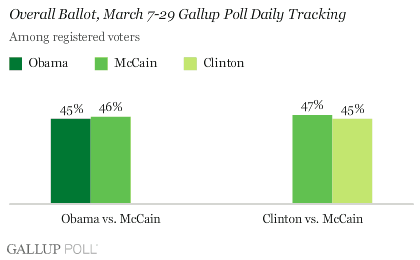Obama, Clinton Leverage Different Groups vs. McCain
Gallup
April 2, 2008
Gallup Poll Daily tracking results for the general election have shown that both Barack Obama and Hillary Clinton are essentially tied with John McCain among registered voters nationwide.

At this point, then, there would appear not to be a major difference in the overall strength that either Democratic candidate would bring to bear in the general election against McCain.
But an analysis of the vote patterns within segments of the voting population shows that the way in which the two Democratic candidates arrive at that parity with McCain is quite different.
A new Gallup analysis of 19,076 interviews conducted between March 7 and March 29 segments the registered voters into a number of groups, based on partisan identification and ideology.
The basic relationship between these two variables and the general election vote is displayed in the accompanying tables.

In a broad sense, the difference in voting patterns for both Democratic candidates by partisan/ideological group follows a predictable pattern. The two candidates do best among liberal Democrats, and then progressively worse among moderate Democrats, conservative Democrats, "pure" independents (who do not lean toward one party or the other), and moderate/liberal Republicans. They do worst among conservative Republicans.
The analysis can be continued with a more detailed examination of the electorate, separating voters into three groups based on race and ethnicity. Given the dominant percentage of non-Hispanic whites in the sample, the accompanying table displays the vote of non-Hispanic whites broken into partisan and ideological categories, along with the voting patterns of white Hispanics and non-Hispanic blacks.


Here, Obama's margin over McCain among non-Hispanic black registered voters is 85 points, while Clinton's margin is 69 points. In other words, while both Democrats dominate McCain among black voters, Obama has a significantly larger margin over McCain than does Clinton. (It appears that black voters are less likely to say they would vote for Clinton against McCain and more likely to say they don't have a preference between the two.)
Clinton does slightly better than Obama against McCain among Hispanics.
There are different, and interesting, patterns in the relative performances of Clinton and Obama against McCain among whites across party and ideological groups.
In general, Clinton does better among all three groups of white Democrats against McCain than does Obama. The difference between Obama and Clinton is largest among conservative white Democrats. In fact, among this group, Obama manages to get only 50% of the vote to McCain's 35%, while Clinton wins by a much larger 68% to 25% margin.
Obama makes up for this, however, with a stronger relative performance among independents and Republicans. While McCain outpolls both Clinton and Obama among "pure independents," Obama is somewhat more competitive with him among this group (trailing by 22 points, compared with 32 points for Clinton). McCain, of course, beats both candidates by significant margins among the two groups of Republicans used in this analysis. But again, Clinton loses by slightly larger margins than does Obama.
Implications
At this point in the election cycle, there are more Democrats and Democratic-leaning independents than there are Republicans and Republican-leaning independents. McCain has been able to hold his own against the two Democratic candidates in the general election trial heat ballots in the face of this disparity mostly because he does very well among conservative Republicans and wins among independents.
The two Democratic candidates offer different profiles of strengths and weaknesses when pitted against Republican McCain in the general election. Obama's strength is his appeal to black voters, and his somewhat greater appeal than Clinton's to independents and Republicans. On the other hand, although Clinton attracts the support of a lower percentage of blacks than Obama, she has a stronger appeal to white Democrats, particularly white conservative Democrats, only half of whom at this point say they would vote for Obama if he were the nominee pitted against McCain. Clinton has a very slight advantage over Obama in the matchup with McCain among Hispanics.
When the votes of all registered voters are averaged, as noted previously, the two Democratic candidates end up performing about the same against McCain. Clinton appears better able to gain the support of the Democratic base, particularly Democrats more on the fringe of the party (conservatives), while Obama builds his coalition with a stronger appeal to independents, Republicans, and black voters.
Obama enjoys the traditionally high support from black Democrats that all recent Democratic nominees have received. However, Obama would have the challenge of shoring up support among white Democrats if he were the nominee, while Clinton would be faced with the prospect of expanding her support among independents and "soft" Republicans (while at the same time motivating black voters). Looking ahead to the fall election, it is not clear at this point if one of these profiles of support is better from a strategic campaign perspective than the other.
Survey Methods
Results are based on Gallup Poll Daily tracking interviews with 19,076 registered voters, aged 18 and older, conducted March 7-29, 2008. For results based on the total sample of registered voters, one can say with 95% confidence that the maximum margin of sampling error is ±1 percentage point.
Interviews are conducted with respondents on land-line telephones (for respondents with a land-line telephone) and cellular phones (for respondents who are cell-phone only).
In addition to sampling error, question wording and practical difficulties in conducting surveys can introduce error or bias into the findings of public opinion polls.
